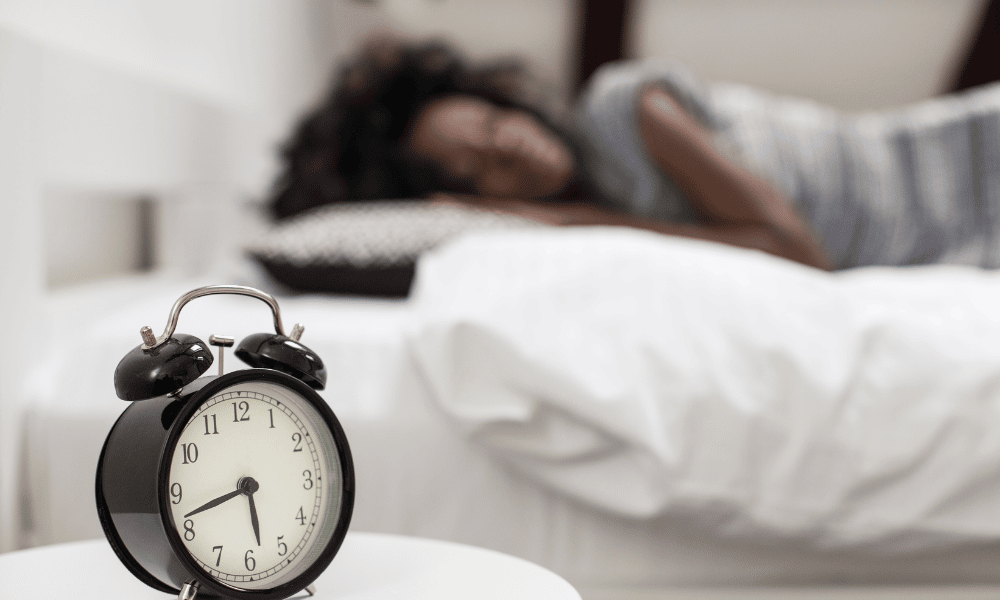All tucked in for a full night’s sleep. Bed is warm, the blankets are soft and cozy, the room is nice and dark and quiet. Take a few big deep breaths and close your eyes and poof, off to dreamland…Brain: “I wonder if I emptied the lint trap. Should I go back to school and take a cooking class? I hate my job but I need the money. I should have stopped and helped that lady at Costco put that big box in her cart. I’d love to go skydiving. Do squirrels actually hibernate or do they just eat nuts all winter?
If this sounds familiar you’re not alone. According to one study, as many as 41% of the population are struggling with sleep disorders. It’s a true epidemic and there are a whole bunch of reasons as to why it’s happening. The major struggle is that it appears to be a vicious cycle. Being anxious can disrupt sleep, having disruptive sleep can cause anxiety.
According to Dr. Julia Kogan, a health psychologist specializing in sleep and stress from Miami, Florida: “Lack of sleep and anxiety are highly connected. Those who suffer from sleep problems often have issues with anxiety. Those who have anxiety often struggle with sleep issues.” Kogan says that when you’re not sleeping well your body releases more cortisol, a hormone associated with stress. This can cause uncomfortable symptoms, such as headaches or digestive issues, that can make you feel anxious or give you low energy due to poor sleep. “The more activated the nervous system, the harder it is to fall asleep,” Kogan explains. So, if you’re feeling anxious, it’s unlikely you’ll be able to fall asleep and stay asleep. This can then cause a loop where you’re not sleeping and you’re feeling more anxious. This results in even more problems with sleep, Kogan says.
See that bolded sentence? That’s typically the missing piece and often the key to getting a good night’s rest. I’m talking about a real night’s rest. Where you wake up feeling refreshed, clear headed, and ready to take on the day. So here’s how it works. The nervous system pretty much controls and maintains everything in your body. Some studies are estimating the nervous system is transferring as much as 11 TRILLION bits of information per SECOND! That’s like an internet speed of 11 Terabytes! That’s a ton of information heading to the brain to the body. Here’s the thing, there’s a switch in your brain in an area called the brainstem (It’s where the spinal cord and brain connect) and it literally tells your brain how to act when it gets this information.
The thing is, your brain stem is part of your “autonomic nervous system”. It’s what keeps your heart beating, keeps you breathing, digesting, measures blood chemistry, pretty much everything that keeps you alive without you having to think about it (can you IMAGINE having to think about all those things AND get through your day!). Because it’s automatic, we really don’t have too much control over it. It runs without any of our conscious thoughts and it’s the gatekeeper on how your brain receives all those trillions of bits of information.
Basically, there’s only two options, fight/flight or rest/relax. Stress or not stress, safe or not safe. Most of the time, because of all the stressors we face in life, the brain stem starts telling the brain that these signals belong in the “fight/flight” category. If this continues for too long it can become darn near permanent. In other words, your brain is locked into fight or flight, even when you’re trying to sleep. All those trillions of signals are forced through the “stress” side, even the sleep signals! Over time, it creates a “feedback loop”. Stress signals in, stress signals out.
Eventually, you’re a giant stress ball that can’t relax, feels like your shoulders are up past your ears, small things start to bother you and stress you out and you just can’t seem to recover no matter what you do. You need a vacation from taking a vacation. You can live on coffee and Red Bull and still be exhausted. You can take sleeping pills, melatonin, sleepy tea; you can stop your screen time, have a white noise speaker, use the best pillows and sheets and still not fall asleep.
I need you to hear me…it’s not your fault! Your brainstem is the likely culprit! You can’t meditate, medicate or even roller skate your way out of this. It’s like the gas pedal in your car is stuck and you’re idling at 3,000 RPM’s at a stop light. Adding more oil won’t help, turning up the stereo won’t help, shutting the AC off won’t help. Only taking pressure off the pedal will do the trick. And guess what, the car immediately goes into idling. It didn’t need anything else, just no more pressure and poof, it just happens.
This is what we see virtually every day at our offices. People coming in with horrible sleep (and health) problems, trying different meds, programs, exercise, diets, therapists etc. What they really need is someone to take their foot off the gas pedal and poof, their body goes back into rest/digest mode all by itself. This is a measurable and reliable test that we use on our patients every day to determine what state their nervous systems are in. If they are in rest/digest mode, we’re stoked and we send them on their way, no adjustment needed. If they are stuck and locked back into their old fight/flight mode then we use the adjustment to get them out of that state. Then we have them take a 20 minute nap, you read that right, a 20 minute nap. We want our patients to STAY in that calm and rested state before they hop in their cars and head back to their busy days. It’s amazing what a little bit of rest can do for you and we’ve seen our patients “hold” their adjustment (meaning they don’t need another one) for weeks and months!
Bottom line: sleepless nights can cause anxiety and having anxiety can cause sleepless nights. If you find yourself struggling in these areas and you’re looking for help getting off that merry-go-round, please reach out. We’ll do our best to help you out and if we can’t help we’ll do our best to point you in the right direction. Take action now and get a good night’s rest!

